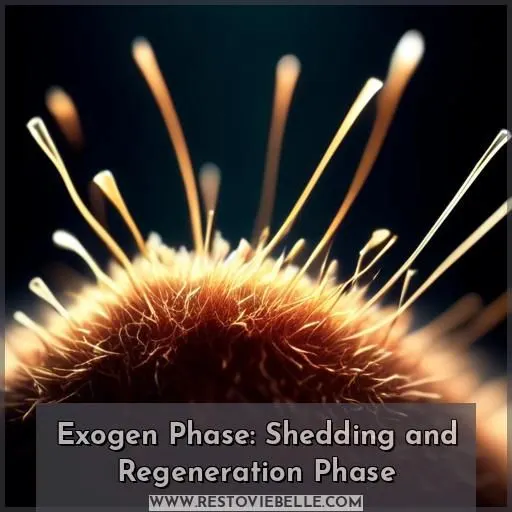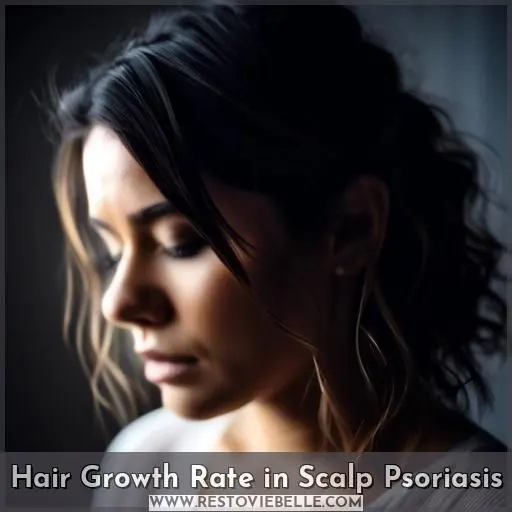This site is supported by our readers. We may earn a commission, at no cost to you, if you purchase through links.

Hair typically grows at an average rate of 0.5 inches per month, but this can vary based on factors like your genetics, lifestyle, and health. Asian hair tends to grow the fastest at 0.8 inches per month, while African hair grows the slowest at 0.2 inches per month.
The full hair growth cycle consists of anagen (growth), catagen (transition), telogen (resting), and exogen (shedding) phases, which can take 2-7 years to complete.
As you age, your hair growth may slow down, and certain conditions can also impact the rate. If you’d like to learn more about the intricacies of hair growth, I’d be happy to provide additional details.
Table Of Contents
- Key Takeaways
- How Long Does It Take for Hair to Grow?
- Anagen Phase: Hair Growth Rate
- Catagen Phase: Transition to Resting Phase
- Telogen Phase: Resting and Shedding Phase
- Exogen Phase: Shedding and Regeneration Phase
- Hair Growth Cycle Stages
- Hair Growth Rate by Ethnicity
- Hair Growth Rate After Age 30
- Hair Growth Rate in Pattern Hair Loss
- Hair Growth Rate in Alopecia Areata
- Hair Growth Rate in Scalp Psoriasis
- Frequently Asked Questions (FAQs)
- Conclusion
Key Takeaways
- Hair typically grows at an average rate of 0.5 inches per month, but this can vary based on factors like genetics, lifestyle, and health.
- Asian hair tends to grow the fastest at 0.8 inches per month, while African hair grows the slowest at 0.2 inches per month.
- The full hair growth cycle consists of anagen (growth), catagen (transition), telogen (resting), and exogen (shedding) phases, which can take 2-7 years to complete.
- Hair growth is influenced by multiple factors, including genetics, lifestyle, and overall health.
How Long Does It Take for Hair to Grow?
On average, hair grows about half an inch per month, meaning it typically takes about two to six months for hair to noticeably grow back. This growth rate can vary based on factors like genetics and the health of the hair.
Anagen Phase: Hair Growth Rate
Hair growth rate is influenced by various factors, including genetics, lifestyle, and overall health. The anagen phase of the hair growth cycle, which is the growth phase, is most affected by genetics. On average, hair grows at a rate of about 0.5 inches per month (or six inches a year). However, this growth rate can vary depending on ethnicity, with Asian hair growing at a rate of 0.8 inches per month, while hair in people of African descent tends to grow around 0.2 inches per month.
Genetics play a significant role in hair growth rate and density. Hair follicles are produced in the anagen phase, and the duration of this phase can be influenced by genetic factors. As we age, hair growth slows down, and the hair follicles may even stop producing hair altogether, contributing to hair thinning and baldness.
Supplements and lifestyle factors can also impact hair growth. A balanced diet rich in protein, vitamins, and minerals is essential for hair growth. Certain supplements, such as zinc, biotin, and omega-3 fatty acids, may help promote hair growth by correcting nutrient deficiencies. Stress and hormonal imbalances can also affect hair growth, as they can impact the hair follicle cycle.
Catagen Phase: Transition to Resting Phase
In the catagen phase, your hair follicles undergo a shift to a resting phase. This phase typically lasts for about 2-3 weeks. During this time, the hair follicle shrinks, and the hair shaft becomes attached to the root.
The catagen phase is triggered by various factors, including hormonal changes, stress, and nutritional deficiencies.
To prevent hair loss and promote healthy hair growth, consider treatments like finasteride or minoxidil, nutraceuticals, and platelet-rich plasma therapy. Remember, hair growth is influenced by multiple factors, so maintaining a balanced diet, reducing stress, and seeking medical consultation can also help.
Telogen Phase: Resting and Shedding Phase
In the telogen phase, your hair is in a resting state, and the growth process slows down. During this phase, the hair follicle is inactive, and the hair strand is fully formed. The duration of the telogen phase varies, but typically lasts for about 3 months.
Shedding rate is influenced by scalp health, hair care, vitamin deficiencies, and hair growth treatments. It is important to maintain a balanced diet and ensure proper hair care to support hair growth and minimize hair loss.
Exogen Phase: Shedding and Regeneration Phase
The exogen phase is the shedding and regeneration phase of the hair growth cycle. During this stage, hairs in the telogen phase are shed, and new hairs begin to grow in the anagen phase. The exogen phase is essential for maintaining healthy hair growth, as it allows for the shedding of damaged or weak hairs and the regeneration of new, strong hairs.
- Shedding of telogen hairs
- Regeneration of anagen hairs
- Importance of exogen phase for healthy hair growth
- Balance between shedding and regeneration
The exogen phase is a natural part of the hair growth cycle, and it plays a key role in maintaining healthy hair growth. By understanding the exogen phase and its importance, you can better appreciate the complex process of hair growth and take steps to support healthy hair growth.
Hair Growth Cycle Stages
Hair growth is a complex process that involves many stages and factors. The hair growth cycle consists of three main stages: anagen, catagen, and telogen. Each stage plays a vital role in the overall growth and health of the hair.
- Anagen Phase: This is the active growth phase, where the hair follicle is in the process of creating new cells, leading to the rapid lengthening of the hair. Hair can remain in this phase for anywhere from 2 to 7 years, depending on factors such as genetics, age, and overall health.
- Catagen Phase: This is a temporary stage, lasting only a few weeks. During this phase, hair growth slows down, and the hair follicle separates from the blood supply, leading to the formation of a club hair, which is the root of a new hair.
- Telogen Phase: This is the resting phase, where the old hair is lost, making way for new hair growth to begin. On the scalp, approximately 10-15% of hair is in the telogen phase at any given time.
Understanding these stages can help you better manage your hair growth and address any issues that may arise. For example, if you notice increased hair loss postpartum, it could be due to a sudden drop in estrogen levels, which shortens the anagen phase. Similarly, stress and inflammatory scalp conditions can disrupt the hair growth cycle, leading to hair loss and thinning.
To support healthy hair growth, it’s essential to provide proper nourishment, avoid excessive stress, and seek medical advice if you experience unexplained or severe hair loss.
Hair Growth Rate by Ethnicity
Hair growth rates vary markedly across different ethnicities. Asian hair generally grows the fastest at 0.49 inches per month, followed by white and Latino hair at 0.44 inches per month. Black hair grows at the slowest rate of 0.33 inches per month.
These differences are primarily due to genetic factors, with hair growth rates being influenced by the structure and composition of hair follicles. However, it’s important to note that hair growth rates can be affected by various factors, including age, health, and hair care practices.
Hair Growth Rate After Age 30
As you age, your hair growth rate may slow down, and you may notice changes in your hair’s thickness and texture. This is due to a combination of factors, including hormonal fluctuations, metabolic shifts, and changes in follicular activity.
After the age of 30, hair growth rates may decrease, and you may experience hair loss, particularly if you have a family history of baldness. To maintain healthy hair and prevent hair loss, it’s imperative to adopt a balanced diet, avoid tight hairstyles, and practice stress-reducing techniques.
Additionally, you may consider using hair growth solutions like finasteride or minoxidil, which can help slow hair loss and promote new hair growth. Regular hair care, such as gentle shampooing and conditioning, can also help maintain hair health and prevent breakage.
Hair Growth Rate in Pattern Hair Loss
When grappling with pattern hair loss, you’re facing a duel against dwindling follicles. Minoxidil’s effectiveness lies in its ability to kickstart follicle regeneration, giving you a fighting chance for hair regrowth.
On the other side, finasteride wages war on DHT, the notorious hormone that sends hair into retreat. However, finasteride’s side effects can be a wild card. Hair growth rate may slow, but with the right hair loss prevention products and treatment, you can still hold the line.
The key combatants are Minoxidil and finasteride. Minoxidil gives you a fighting chance for hair regrowth, while finasteride wages war on DHT. But beware, finasteride’s side effects can be a wild card.
Hair Growth Rate in Alopecia Areata
Alopecia Areata: Unpredictable Hair Growth Patterns
Alopecia areata is an autoimmune condition that causes hair to fall out in patches, often on the scalp but also on other parts of the body. The hair loss is temporary, and hair may grow back at any time, although the growth pattern is unpredictable. In some cases, hair may regrow without treatment, while in others, it may require medical intervention.
The hair loss in alopecia areata isn’t permanent, as the hair follicles aren’t destroyed. This means that hair can regrow, although the rate and extent of regrowth can vary. In some cases, hair may regrow within a year without treatment, while in others, it may take longer or may not regrow fully.
Treatment options for alopecia areata include topical steroids, injections of steroids, topical minoxidil (Rogaine), topical irritants, immunotherapy, or pills that suppress the immune system. The choice of treatment depends on the severity and duration of the hair loss, as well as the individual’s overall health and medical history.
In addition to medical treatments, there are also hair products and hair loss prevention supplements that may help support hair growth. These include topical melatonin, which has been shown to reduce hair loss and promote hair regrowth, and keratin supplements, which can improve hair health and reduce damage.
It is important to consult a healthcare professional for unexplained or severe hair loss to determine the underlying cause and appropriate treatment. Alopecia areata is just one of many conditions that can affect hair growth, and a proper diagnosis is vital for effective treatment and management.
Hair Growth Rate in Scalp Psoriasis
In the world of hair growth, scalp psoriasis presents a unique challenge. This immune-mediated condition can cause flaky red patches on your scalp, resulting in temporary hair loss. However, with effective psoriasis treatment, hair growth can resume.
Nonetheless, excessive scratching of the scalp can exacerbate hair loss. Therefore, it’s crucial to handle your hair with care, particularly during psoriasis flare-ups.
To maintain hair health and prevent hair loss, consider implementing hair loss prevention home remedies, dietary modifications, and lifestyle adjustments. Incorporating biotin-rich foods into your diet can also be beneficial for hair loss prevention.
Frequently Asked Questions (FAQs)
How does sleep deprivation affect hair growth?
Insufficient sleep can slow your hair’s growth. Lack of shuteye disrupts the hormones that fuel follicle activity, stunting new strand development. Get those precious Zs – your tresses will thank you!
What are some sleep disorders that can negatively affect hair growth?
One surprising sleep disorder, sleep apnea, can stall hair growth by 25%. But don’t nod off just yet – improving your sleep quality could actually rev up your hair follicles.
How does cortisol, a stress hormone, impact hair growth?
Cortisol, the stress hormone, can really put the brakes on hair growth. It slows down the hair growth cycle, leading to shedding and thinning. Keeping cortisol in check is essential for a healthy, flourishing mane.
What is the role of melatonin in hair growth?
Melatonin, the moonlight hormone, doubles as a powerful hair growth booster. It stimulates hair follicles and extends the active growth phase, like a nighttime gardener nurturing your lush locks to bloom.
How can maintaining a consistent sleep schedule promote healthy hair growth?
Maintaining a consistent sleep schedule keeps your body’s circadian rhythms in sync, optimizing melatonin production to promote healthy hair growth cycles. Sweet dreams and fuller locks – a win-win!
Conclusion
Remarkably, Asian hair grows at an exceptional rate of 0.8 inches per month, almost twice the average.
While your hair growth may decline as you age, comprehending the intricacies of the hair growth cycle can assist you in managing the duration it takes for your hair to regenerate.
By becoming familiar with the crucial stages of the hair growth cycle, you’ll gain valuable insights into how your hair grows and how to optimize its healthy development.















